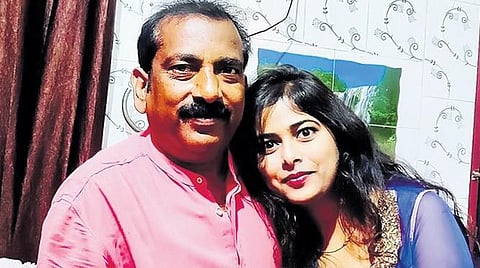

One of India’s contradictions, expressed so often that it is a trope, is that this is a country that worships goddesses and abuses women. Fittingly timed this past Navaratri, a rare story emerged that made some waves, one that doesn’t disprove the trope but does fleetingly assuage the reality-sickened heart. In certain regional manifestations of the festival’s myths, the goddess Durga “comes home” during those nine nights and ten days of honouring her. In Ranchi, on October 15, 2023 — the first day of Navaratri this year — a woman named Sakshi Gupta returned to her family’s home after the end of her marriage. Her parents, Prem and Veena, escorted her back from her former in-laws’ home, where she was domiciled during the brief marriage, with a full band and fireworks. They celebrated her freedom.
It’s like something out of a film — not only because of the grandeur and spectacle but also because of its rarity. When was the last time that a woman in India exiting an unhappy or abusive marriage was so proudly feted and declared to the world by her parents? May there be many more such loving expressions, until the taboo breaks. Perhaps one day divorce celebrations will become as banal (and as boring) as weddings.
I jest (sort of). India isn’t going to stop being misogynistic any time soon, which is why every inch forward toward a more equal future, even if we won’t fully experience it in our own lifetimes, matters. In our own lifetimes too, we deserve to see progress — and to celebrate wins small and big, as we strive on.
The Guptas’ beautiful gesture is twofold: firstly, to their own daughter, to her former in-laws and within their own circles, they have made a powerful statement that directly and positively impacts their own lives and those around them. Rising divorce rates in India — regardless of which party files for it — largely indicate greater empowerment of women, who reject the inequalities within the institution. They are a good thing.
Secondly, their decision to publicise (Mr. Gupta posted a video on social media) how they had stood by their daughter and celebrated her separation just as they had her wedding is an act of goodwill towards society at large. I would go as far as to say that it is essentially revolutionary: an invitation to families across the country to change their minds and hearts. To see someone else making a supportive choice bravely and joyfully may inspire others to do the same. Many women have walked out of marriages without familial support.
The Guptas have set a wonderful example of how they don’t have to. Still, while I wasn’t jesting about weddings being boring, I was jesting about divorce celebrations becoming commonplace. It’s divorced and destigmatising them that should become more common. Repeated taboo-breaking normalises choices until they no longer carry as heavy a stigma if one at all. The true impact of the loud, proud jamboree of the Guptas welcoming their daughter home cannot be understood only by counting similarly visible events. Encouragement and acceptance can also be very quiet — invisible tremors that shake society from deep within, each time.
Sharanya manivannan|
The columnist is a
writer and illustrator